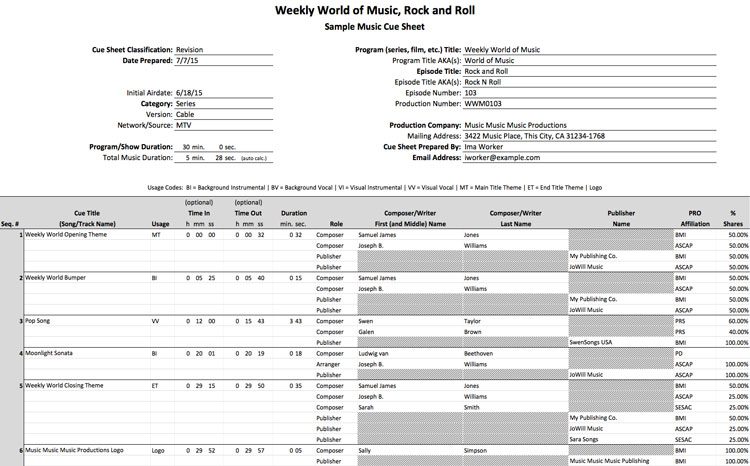Keeping track of all the music used in films and on television shows is a formidable task, but one that BMI enthusiastically undertakes to ensure its writers and publishers receive the royalties due them.
BMI maintains vast computer databases logging the music composed for past film and television work, which is systematically updated. But the database alone cannot reflect all of the music used in new productions. This gargantuan job is made feasible only by the use of cue sheets.
Cue sheets are the primary means by which performing rights organizations track the use of music in films and TV. Without cue sheets, it would be nearly impossible for such composers and publishers to be compensated for their work.
An accurately filled out cue sheet is a log of all the music used in a production. This information includes:
- Series/Film Title
- Series/Film Title AKA
- Episode Title
- Episode Title AKA
- Episode Number
- Air Date
- Show Length
- Music Length
- Production Company Information
- Song/Cue Title
- Composer
- Publisher
- Performing rights society
- Timing
- Usage
If there is more than one composer for an individual piece of music, or if the writer and publisher split their royalties on other than a 50/50 basis, this must also be indicated on the cue sheet, and these become important factors in BMI’s payment calculations.
With the increase in independent producers and cable operations, the filing of accurate cue sheets has become even more crucial to tracking the use of music in film and television productions. These newcomers to the industry are sometimes unfamiliar with, or unaware of, the legal and professional responsibilities involved in using the music of composers and publishers whose rights are represented by performing rights societies.
Since BMI’s calculation of royalties depends upon a detailed and accurate cue sheet, it is in composers’ and publishers’ best interests to make sure that cue sheets are properly prepared and submitted by the production company. It is not uncommon—and is often helpful—for a composer to prepare a cue sheet him/herself for comparison purposes or ask to see those filled out by the production company before it is submitted to the publisher and/or the performing rights organization.
Checking to make sure that the cue sheets have been prepared and filed is good insurance for receiving accurate compensation for your compositions.
Sample Music Cue Sheet
Downloads
For more information on RapidCue® and submitting cue sheets, visit the official RapidCue® website.


